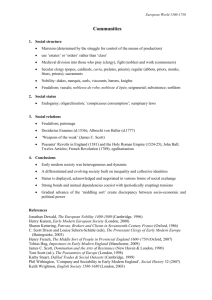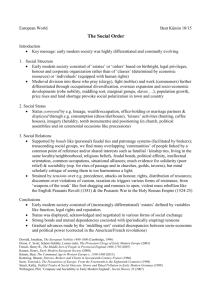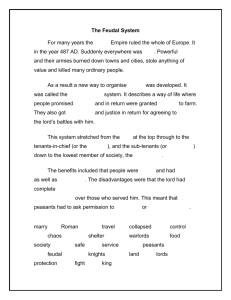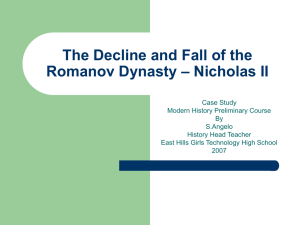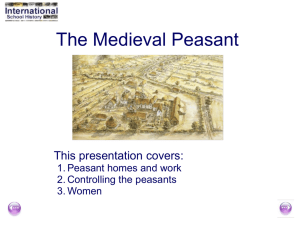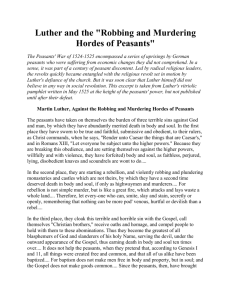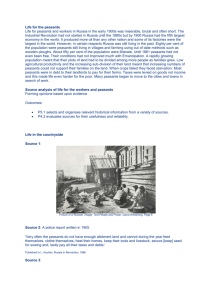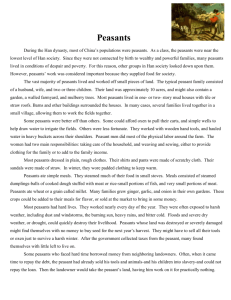Social Status and Social Relations
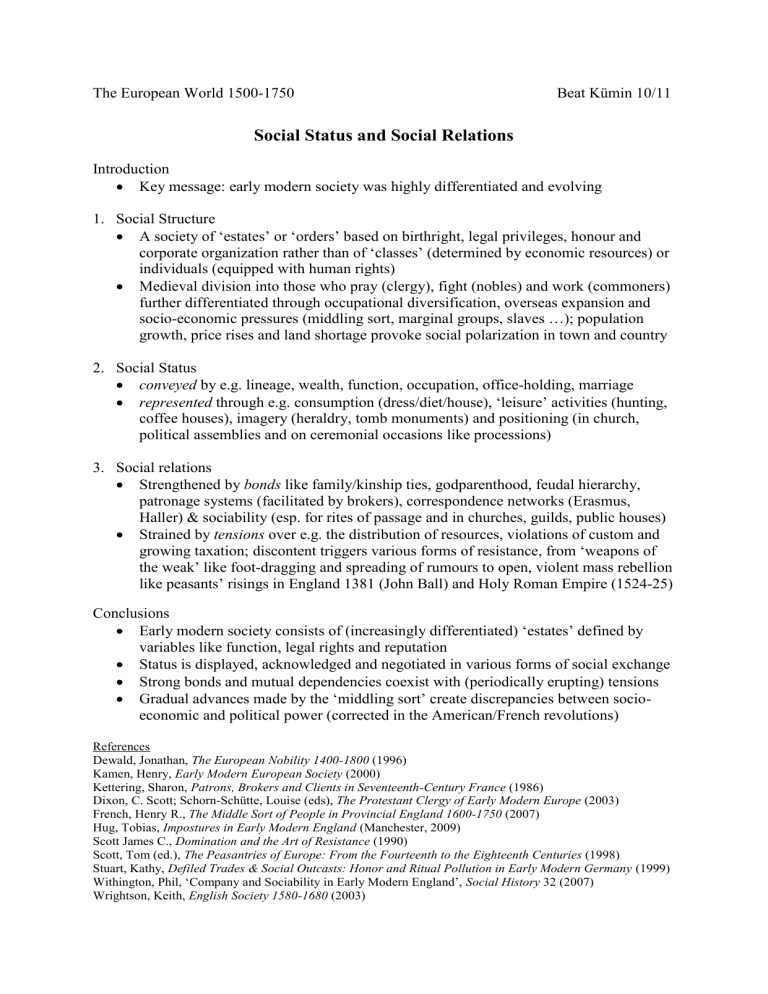
The European World 1500-1750 Beat Kümin 10/11
Social Status and Social Relations
Introduction
Key message: early modern society was highly differentiated and evolving
1.
Social Structure
A society of ‘estates’ or ‘orders’ based on birthright, legal privileges, honour and corporate organization rather than of ‘classes’ (determined by economic resources) or individuals (equipped with human rights)
Medieval division into those who pray (clergy), fight (nobles) and work (commoners) further differentiated through occupational diversification, overseas expansion and socio-economic pressures (middling sort, marginal groups, slaves …); population growth, price rises and land shortage provoke social polarization in town and country
2.
Social Status
conveyed by e.g. lineage, wealth, function, occupation, office-holding, marriage
represented through e.g. consumption (dress/diet/house), ‘leisure’ activities (hunting, coffee houses), imagery (heraldry, tomb monuments) and positioning (in church, political assemblies and on ceremonial occasions like processions)
3.
Social relations
Strengthened by bonds like family/kinship ties, godparenthood, feudal hierarchy, patronage systems (facilitated by brokers), correspondence networks (Erasmus,
Haller) & sociability (esp. for rites of passage and in churches, guilds, public houses)
Strained by tensions over e.g. the distribution of resources, violations of custom and growing taxation; discontent triggers various forms of resistance, from ‘weapons of the weak’ like foot-dragging and spreading of rumours to open, violent mass rebellion like peasants’ risings in England 1381 (John Ball) and Holy Roman Empire (1524-25)
Conclusions
Early modern society consists of (increasingly differentiated) ‘estates’ defined by variables like function, legal rights and reputation
Status is displayed, acknowledged and negotiated in various forms of social exchange
Strong bonds and mutual dependencies coexist with (periodically erupting) tensions
Gradual advances made by the ‘middling sort’ create discrepancies between socioeconomic and political power (corrected in the American/French revolutions)
References
Dewald, Jonathan, The European Nobility 1400-1800 (1996)
Kamen, Henry, Early Modern European Society (2000)
Kettering, Sharon, Patrons, Brokers and Clients in Seventeenth-Century France (1986)
Dixon, C. Scott; Schorn-Schütte, Louise (eds), The Protestant Clergy of Early Modern Europe (2003)
French, Henry R., The Middle Sort of People in Provincial England 1600-1750 (2007)
Hug, Tobias, Impostures in Early Modern England (Manchester, 2009)
Scott James C., Domination and the Art of Resistance (1990)
Scott, Tom (ed.), The Peasantries of Europe: From the Fourteenth to the Eighteenth Centuries (1998)
Stuart, Kathy, Defiled Trades & Social Outcasts: Honor and Ritual Pollution in Early Modern Germany (1999)
Withington, Phil, ‘Company and Sociability in Early Modern England’, Social History 32 (2007)
Wrightson, Keith, English Society 1580-1680 (2003)
‘None shall wear any cloth of gold, tissue, nor fur of sables: except duchesses, marquises, and countesses in their gowns; [none shall wear] silver, tinseled satin or silk …: except all degrees above … baronesses, and other personages of like degrees in their kirtles and sleeves.
[None shall wear] velvet … embroidery or … lace of gold or silver: except all degrees above mentioned, the wives of knights of the Garter and of the Privy Council ...
[None shall wear] satin, damask, or … fur whereof the kind groweth not within the
Queen's dominions …: except the degrees and persons above mentioned, or the wives of those that may dispend £100 by the year and so valued in the subsidy book.
No persons under the degrees above specified shall wear any guard or welt of silk upon any petticoat, cloak, or safeguard.’
‘Statute of Apparel’ issued by Elizabeth I in 1574, cited in ‘Elizabethan Era’ (http://www.elizabethanera.org.uk; accessed 19/10/2010).
In Star Chamber, Giles Dobell of Minhead (Somerset) complained that Robert Heyward and others ‘with force of arms, that is to say with swords and daggers and other weapons … took out Margaret, [my] wife, out of her pew where she was kneeling in the church and brought
[her] out into an aisle … against her will and then and there did beat and ill use her.’
Pre-Reformation lawsuit cited in K. French, The Good Women of the Parish (Philadelphia, 2008), 115.
[Diary entry by Felix Platter for 13 October 1552] Travelling with a group of scholars from
Basel to Geneva, ‘we arrived at [Mézières in Vaud]. There was a bad tavern and a few scattered houses, only the landlady was in attendance and all she had was one big lounge on the ground floor, with one open window. In the room several peasants and beggars from
Savoy sat around a long table … . We would have liked to move on, but it was wet and dark, forcing us to stay, even though the landlady told us that she had neither beds nor stables. …
[The peasants] got drunk and staggered across to the fireplace in the hall, where they fell asleep. We were very worried, closed the shutters, moved a broken bed against the loungedoor … stayed awake [and fled the place in the middle of the night].’
V. Lötscher (ed.), Felix Platter – Tagebuch [Diary] (Basel, 1976), 132-4.
‘When Adam delved and Eve span, Who was then the gentleman ? From the beginning all men by nature were created alike, and our bondage or servitude came in by the unjust oppression of naughty men. For if God would have had any bondmen from the beginning, he would have appointed who should be bond, and who free. And therefore I exhort you to consider that now the time is come, appointed to us by God, in which ye may (if ye will) cast off the yoke of bondage, and recover liberty.’
John Ball’s sermon to the rebels in the English rising of 1381; cf. R. B. Dobson, The Peasants’ Revolt of
1381 (2 nd edn, London, 1983).
‘Third, until now it has been the custom for us to be regarded as a lord’s personal property, which is deplorable since Christ redeemed us all with the shedding of his precious blood.
…….
Eighth, we are aggrieved, especially those that have their own land, because these lands cannot sustain the payments on them, and because these peasants must then forfeit the land and are ruined.’
Extracts from the ‘Twelve Articles’ of the German Peasants (1525) in: Michael G. Baylor (ed.), The Radical
Reformation (Cambridge, 1991), pp 231-238
